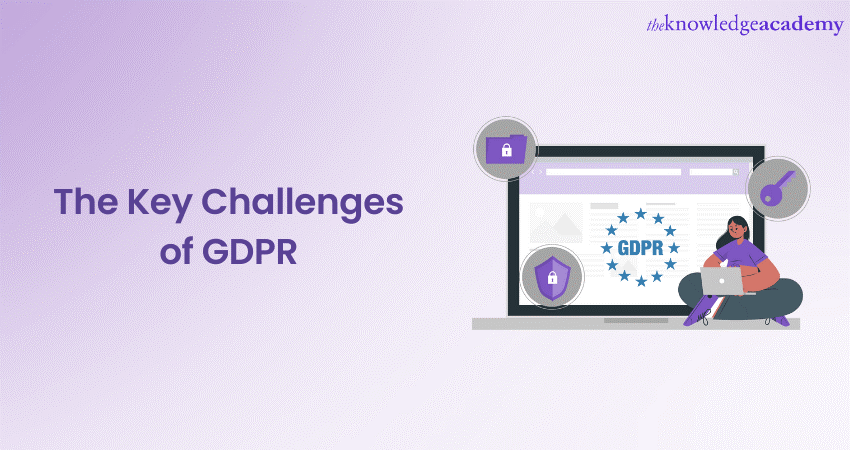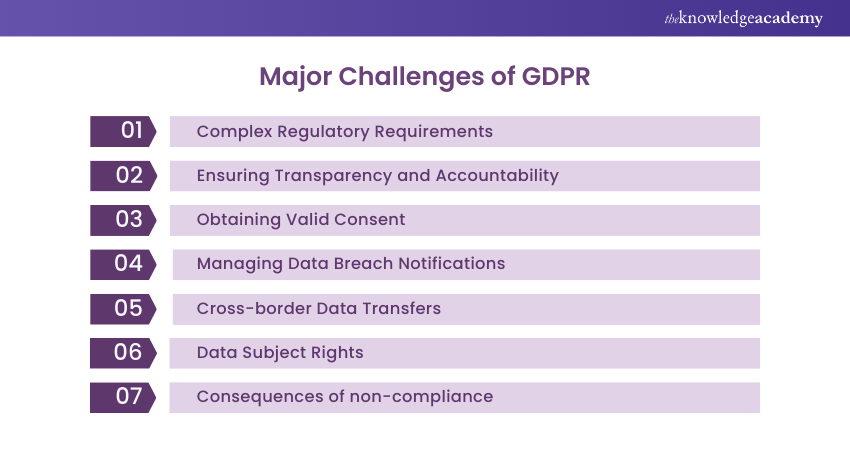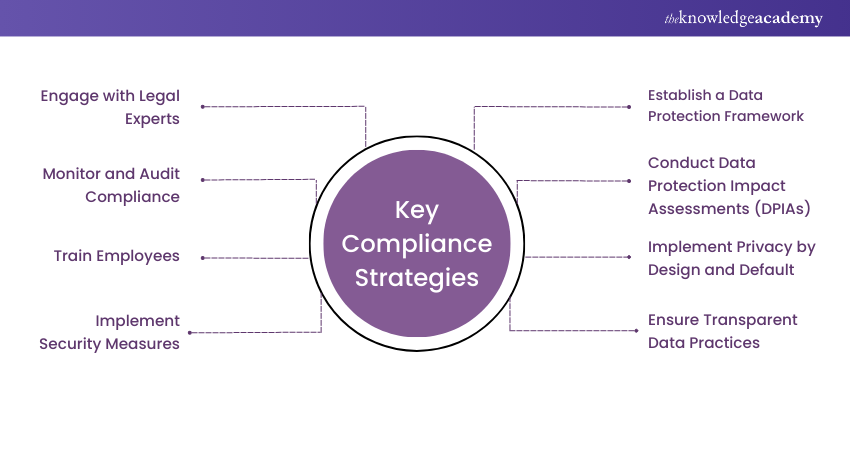We may not have the course you’re looking for. If you enquire or give us a call on +44 1344 203 999 and speak to our training experts, we may still be able to help with your training requirements.
Training Outcomes Within Your Budget!
We ensure quality, budget-alignment, and timely delivery by our expert instructors.

The General Data Protection Regulation (GDPR) is a noteworthy legislation revolutionising Data Protection practices and privacy rights. According to Statista, fines of over 1.67 billion have been levied due to the non-compliance of companies with general data processing principles. In light of this, do you wonder what are the key Challenges of GDPR that organisations face today?
From ensuring compliance to managing data breaches, the challenges of GDPR are multifaceted and ever-evolving. This blog delves into the critical obstacles posed by GDPR and offers insights into overcoming them. Read more to explore the Challenges of GDPR and provide practical solutions to help you stay compliant and secure.
Table of Contents
1) GDPR – A brief introduction
2) Compliance Challenges of GDPR
a) Complex Regulatory Requirements
b) Ensuring Transparency and Accountability
c) Obtaining Valid Consent
d) Managing Data Breach Notifications
e) Cross-border Data Transfers
f) Data Subject Rights
g) Consequences of non-compliance
3) Effective compliance strategies
4) Conclusion
GDPR – A brief introduction
The GDPR is an extensive regulation of data protection developed by the European Union (EU) to protect the citizens’ rights and data within the EU. This binding was in the pipeline for quite some time and was enacted in 2018 to replace the Data Protection Directive.
The primary goals of Why is GDPR Important include recognising people’s rights to their data as well as efforts to harmonise the laws that govern the protection of data in the EU. It introduces several key principles that organisations must follow, which are as follows:
a) Lawfulness, Fairness, and Transparency
b) Purpose Limitation
c) Data Minimisation
d) Accuracy
e) Storage Limitation
f) Integrity and Confidentiality
g) Accountability
Legal persons have better rights under GDPR in order to get a GDPR Data Breach, especially with regard to private data. They can obtain the information we hold on them, make changes to their information, ask for the removal of their information under specific circumstances, check on the processing of their information and voice their disapproval of the processing of their information. They also have to be ready to fulfil data subject rights requests within the stipulated time.
GDPR is beneficial to multiple individuals, organisations, and society. Here are some key Benefits of GDPR :
a) Enhanced Data Protection
b) Individual Rights and Empowerment
c) Transparent Data Practices
d) Harmonisation on Data Protection Laws
e) Compliance Culture
Compliance Challenges of GDPR
The implementation of GDPR presents several key challenges for businesses striving to achieve compliance. These challenges include:

1) Complex Regulatory Requirements
One of the major GDPR challenges includes the complex framework of regulatory requirements that organisations must navigate. From establishing legal bases for data processing to implementing privacy by design and default principles, businesses need a comprehensive understanding of GDPR's provisions. Ensuring compliance across various aspects of the regulation can be overwhelming, especially for organisations with limited resources or expertise in Data Protection.
Under GDPR, the complex regulatory requirement of "Privacy by Design and Default" mandates organisations to integrate the protection of privacy and data into the design and development of their products, services, and systems.
For example, a software development company creating a Customer Relationship Management (CRM) system must involve privacy experts, conduct Data Protection impact assessments, implement privacy features, and document compliance efforts to meet this requirement. This ensures Data Protection from the early stages and fosters trust with customers. Compliance requires careful planning, collaboration, and ongoing monitoring.
2) Ensuring Transparency and Accountability
GDPR places a strong emphasis on transparency and accountability in data processing. Organisations must provide individuals with clear and concise information on the manner of data collection and the way it is used and shared.
This involves drafting privacy notices and policies that are easily accessible and understandable to individuals. Implementing mechanisms for accountability, such as maintaining records of processing activities, can also be a challenge for businesses, especially those operating across multiple systems and departments.
Ensure your organization complies with GDPR regulations—enroll in our GDPR Courses and protect data privacy with confidence.
3) Obtaining Valid Consent
Another of the GDPR challenges includes organisations having to obtain valid and informed consent from individuals before collecting and processing their data, and the consent must be given freely, specifically, informed, and unambiguous.
Enterprises must carefully review their consent mechanisms, ensuring that consent requests are clear, granular, and separate from other terms and conditions. Obtaining valid consent can be particularly challenging when dealing with complex data processing activities or sensitive categories of personal data.
4) Managing Data Breach Notifications
GDPR mandates organisations to notify supervisory authorities promptly and affected individuals at the occurrence of a data breach. This requires establishing robust incident response plans, including mechanisms for detecting, investigating, and mitigating data breaches. Developing efficient processes to assess the severity of breaches and determine the appropriate notification steps can be complex, especially for organisations dealing with large volumes of data.
5) Cross-border Data Transfers
GDPR imposes restrictions on transferring personal data to countries that do not offer ample Data Protection and outside the EU. Organisations must ensure that appropriate safeguards, such as binding corporate rules, are in place when transferring data internationally.
With the invalidation of the Privacy Shield framework, organisations face additional challenges in finding suitable transfer mechanisms, potentially requiring case-by-case assessments and additional safeguards.
6) Data Subject Rights
GDPR grants individuals various rights regarding personal data, including access, rectification, restrict processing, and erasing data. Organisations must establish processes to handle data subject rights requests within the specified timeframes and verify individuals' identities properly. Managing a large volume of requests and maintaining a centralised system to track and respond to these requests can be challenging for organisations.
7) Consequences of non-compliance
Non-compliance is one of the most common GDPR challenges, as it can lead to significant consequences, including substantial fines and reputational damage. Organisations must diligently comply to avoid the financial and reputational risks associated with violations. The potential impact of non-compliance poses a constant challenge for businesses, necessitating ongoing monitoring, review, and adjustment of their Data Protection practices.
Become a certified GDPR Foundation professional by signing up for our Certified EU GDPR Foundation Course now!
Effective Compliance Strategies
Compliance with GDPR requires organisations to adopt effective strategies and implement best practices to ensure ongoing adherence to the regulation within the GDPR Scope.. Here are some key compliance strategies and best practices:

a) Establish a Data Protection Framework: Develop a comprehensive framework encompassing policies, procedures, and guidelines aligned with GDPR Requirements.This framework should outline roles, responsibilities, data processing principles, consent mechanisms, and data subject rights processes. Ensure to regularly review and update the framework to reflect changes in the regulatory landscape and organisational needs.
b) Conduct Data Protection Impact Assessments (DPIAs): Performing DPIAs to assess and mitigate privacy risks associated with data processing activities is an effective strategy. Identify and evaluate potential risks to individuals' rights and freedoms, implement necessary safeguards, and document the assessment process. DPIAs should be conducted for high-risk processing activities and regularly reviewed to ensure ongoing compliance.
c) Implement Privacy by Design and Default: Integrate privacy and Data Protection considerations into the design and development of products, services, and systems. From the outset, embed privacy features, such as data minimisation, purpose limitation, and security measures. Adopt privacy-friendly defaults and ensure that only necessary personal data is collected and processed.
d) Ensure Transparent Data Practices: Another effective GDPR compliance strategy is to provide individuals with clear and concise information about how their personal data is collected, used, and shared.
Draft privacy notices and policies that are easily accessible written in plain language, and include relevant details about data processing activities. Communicate any updates or changes to individuals in a timely and transparent manner.
e) Implement Security Measures: You can adopt the required organisational and technical security practices to protect personal data from unauthorised access, disclosure, alteration, or destruction.
Implement encryption, access controls, regular system updates, and employee training on security best practices. Conduct regular security assessments and audits to detect and address vulnerabilities.
f) Train Employees: Provide comprehensive training and awareness programs to employees on GDPR Principles, Data Protection obligations, and their roles in ensuring compliance. It is imperative to constitute a culture of privacy and Data Protection within the organisation, emphasizing the importance of handling personal data securely and responsibly.
g) Monitor and Audit Compliance: Regularly review Data Protection practices, conduct internal audits, and perform periodic assessments to identify areas for improvement. Implement data security rules and processes that allow for continual compliance monitoring and GDPR Risk Assessment.
h) Engage with Legal Experts: xIt is important to engage legal experts or consultants to provide guidance on interpreting and implementing GDPR Requirements. You can also take part in industry forums and attend conferences to gain insights into best practices and emerging trends in Data Protection.
Conclusion
In conclusion, tackling the Challenges of GDPR is no small feat, but with the right strategies, businesses can leverage compliance to gain a competitive edge. By staying informed and proactive, you can protect your organisation and build trust with your customers.
Lead your organisation in Data Protection compliance with our Certified EU GDPR Practitioner Course – join us now!
Frequently Asked Questions

DPAs face challenges such as limited resources, jurisdictional issues, and the rapid evolution of technology. Ensuring consistent enforcement across different regions and handling complex cross-border cases also present significant difficulties.

Interpreting GDPR requirements can be challenging due to ambiguous language, varying interpretations across jurisdictions, and the need to balance Data Protection with business interests. Keeping up with evolving guidelines and legal precedents adds to the complexity.

The Knowledge Academy takes global learning to new heights, offering over 30,000 online courses across 490+ locations in 220 countries. This expansive reach ensures accessibility and convenience for learners worldwide.
Alongside our diverse Online Course Catalogue, encompassing 17 major categories, we go the extra mile by providing a plethora of free educational Online Resources like News updates, Blogs, videos, webinars, and interview questions. Tailoring learning experiences further, professionals can maximise value with customisable Course Bundles of TKA.

The Knowledge Academy’s Knowledge Pass, a prepaid voucher, adds another layer of flexibility, allowing course bookings over a 12-month period. Join us on a journey where education knows no bounds.

The Knowledge Academy offers various GDPR Trainings, including the Data Privacy Awareness Course, GDPR Awareness Training, and Personal Data Protection Bill Training. These courses cater to different skill levels, providing comprehensive insights into GDPR Changes.
Our IT Security & Data Protection Blogs cover a range of topics related to GDPR Benefits, offering valuable resources, best practices, and industry insights. Whether you are a beginner or looking to advance your Information Technology (IT) Security and Data Protection skills, The Knowledge Academy's diverse courses and informative blogs have got you covered.
Upcoming IT Security & Data Protection Resources Batches & Dates
Date
 Certified Data Protection Officer (CDPO)
Certified Data Protection Officer (CDPO)
Fri 10th Jan 2025
Fri 14th Mar 2025
Fri 9th May 2025
Fri 11th Jul 2025
Fri 12th Sep 2025
Fri 14th Nov 2025







 Top Rated Course
Top Rated Course



 If you wish to make any changes to your course, please
If you wish to make any changes to your course, please


